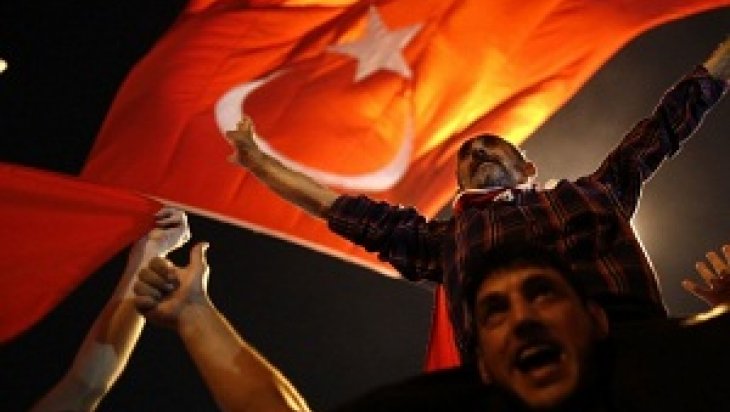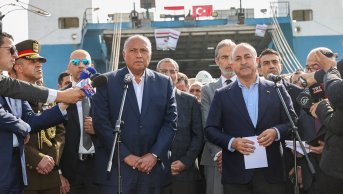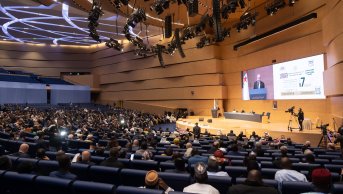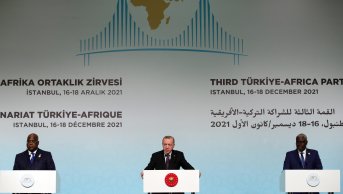“Arab Street” and the Coup Attempt of July 15

Not just Turkey, but also many people from the Muslim world were seriously concerned about the coup attempt of 15 July. Similar concerns were expressed when I received phone calls from friends in Qatar, Algeria, Egypt and Pakistan. My friends said they followed the news closely andwere baffled by the events in Turkey on that night. They wanted to get direct information as to what was going on in Turkey.
I am sure that many people from Turkey who has formal or informal ties with the Muslim world received similar calls that night from different countries and tried to let their friends know that there was nothing to worry about.
These calls can be perceived as a sign of the importance that people from the Islamic world, specifically for those living in Middle East, show for Turkey. This is also the result of Turkey’s foreign policy towards Middle East, on which AK Party specifically put more emphasis than before, was well-received by regional communities.
By implementing a new foreign policy approach Turkey has significantly increased its influence in the Middle East. Additionally, Ankara has become more reliable before Arab community, after it implicitly sided with the Palestinians against the Israeli policies.
Turkey also supported the legitimate uprisings in the Arab world and helped revolutionary actors in countries like Egypt, Tunisia and Syria. As it supported people who fought for their freedom in Middle Eastern countries, Turkey became more respected by the Arab people and also took a leadership position in the eyes of regional countries.
Perception towards Turkey changes
But Turkey’s position is gradually shaken by what has been going on since 2013. In Egypt, Muslim Brotherhood movement that was supported by Turkey, failed after a military coup and was exposed to oppression. Revolutionary groups that were supported by Turkish government couldn’t gain victory in Syrian civil war. Political conflicts gradually increased in Libya. All these factors affected the perception of these countries towards Turkey.
And these changes in perception increased after Erdoğan’s leadership had to take a step back in its foreign policyas he had to deal with other domestic challenges. Nevertheless, Arab community continued to consider Turkey as a model country because of its functioning democracy and economic growth. Ankara’s support for revolutionary actors in the region also helped Turkey to develop a leadership position.
Therefore, not just Turkey, but also Muslim World was shocked by the coup attempt of 15 July 2016. The planned coup aimed to kill President Erdoğan and to change the democratic system in Turkey.
It would not be wrong to say that majority of thepeople in the Islamic countries believe that the July 15 coup attempt was not just against Erdogan’s leadership but also against a political ideologythat defends the legitimacy of people, opposes the dominance of the West in the region and aims to contribute growth and development of the Muslim World as a whole.
Within this context, we can see the effects of this coup attempt on the Middle East. First of all, because of its political stand and foreign policy choices, public opinion for Erdogan’s government was extremely positive. Turkeyunder the leadership of Erdogan was perceived by the regional countriesthat were trapped in a spiral of instability and uncertainty,as a last hope for change and resistance. One indication for this is the fact that Erdogan is attributed a leadership position in many countries includingPalestine, Iraq, Lebanon, and Egypt.
Support from Muslim World
As being attributed a leadership position in the Islamic world, Erdogan enjoyed wide public support in region. People of the Arab and Islamic world followed the coup attempt closely and showed confidence with Turkish government. Many Muslim countries includig Jordan, Somalia, Saudi Arabia, Indonesia, Morocco, Djibouti, Turkmenistan, and Bosnia-Herzegovina expressed their support for Erdogan.
Moreover, Muslims living in other countries were also concerned with the news in Turkey, so they came out to squares or gathered at diplomatic missions of Turkey and organized protests to show their support for Erdoganadministration. I personally attended one of theseprotests organized by the Arab community living in Chicago, and witnessed their support for Erdogan. In these protests there were participants from Egypt, Libya, Syria and Palestine along with Turkish community living in Chicago. All of the speakers emphasized their wish for Erdogan’s leadership to continue. An Arab from Palestine, also one of the organizers of these protests, said that from the moment they heard the news about the coup attempt, they were worried about the fate of Erdogan and Turkey altogether. He added that his family and friends prayed all night long for the failure of the coup attempt.
The prevention of the coup attempt has greater meanings now for the majority of Arab community who expressedtheir support for Erdogan. The Arab community, who had been ruled by leaders whose political wills proved to be loyal to Western countries’ for many years, reacted against the military coup, a method often used in Cold War years, that aimed to overthrowErdogan.
Another reason for this reaction is the belief that there were foreign powers behindthis coup attempt against democratically elected Turkish government. This claim was suggested by some senior officials right after the coup attempt and later mentioned by Erdogan as well. In his statement on August 2, he emphasized the role of Western countries implicitly, by saying “This coup attempt has actors inside Turkey, but its scenario was written outside”.
Witnessing a similar attempt being successful in Egypt and democratically elected Mursi government overthrown in 2013, Arab community has shown a similar reaction towards the coup attempt in Turkey.
This military coup attempt; which is believed to be organized and supported by foreign actors and seeks to drag Turkey, the most determined supporter of freedom (independence) demands of people in Egypt, Yemen, Syria, and Libya during Arab revolution (spring), into instability; should be interpreted as means to destroy the last piece of hope for Arab and Muslim world.
An Important Message
Putting aside ideological differences, Turkey resisted the coup attempt in such a short time, by responding to Erdogan’s call to take streets in defense of democracy. Millions of Turkish people went to streets and squares to fight against the coup plotters. This resistance contains important messages for Arab community as well.
Decisively resisting the coup attempt, Turkey has shown that foreign countries cannot anymore overthrow governments by using local actors in the Middle East. Turkey’s firm stand against the coup attempt has to be perceived as hope for Arab communities who felt disappointed after failed revolutions in Egypt, Syria, Yemen and Libya.
From Palestine to Pakistan, Algeria to Afghanistan and Bosnia to Malaysia, people from entire Muslim world have watched Turkey’s resistance against coup attempt with excitement. In this context we must say that the failure of this coup attempt is not just success for Turkey but also for the Muslim world as well.
One other dimension of the recent events is the leadership position of Turkey in Muslim World. The failed coup attempt not only strengthened the trust towards Turkey and the belief that Turkey will become more powerful, but also helped Turkey’s leadership position to become more visible.











